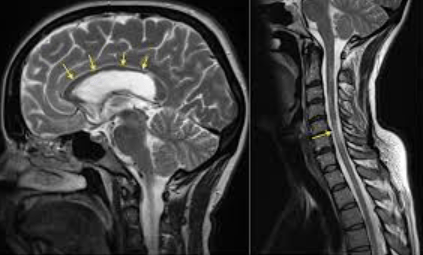Multiple Sclerosis
Multiple Sclerosis (MS) is a potentially disabling disease of the brain and spinal cord (central nervous system). Multiple sclerosis is a chronic disease that affects the central nervous system, which is the brain, spinal cord, and optic nerves. This can lead to a wide range of symptoms throughout the body. The immune system attacks the protective sheath (myelin) that covers nerve fibers and causes communication problems between your brain and the rest of your body. Eventually, the disease can cause permanent damage or deterioration of the nerves.
Symptoms
Multiple sclerosis affects the Central nervous system, which controls all the actions in the body, symptoms can affect any part of the body.
Muscle weakness: People may develop weak muscles due to lack of use or stimulation due to nerve damage.
Numbness and tingling: A pins and needles-type sensation is one of the earliest symptoms of MS and can affect the face, body, or arms and legs.
Lhermitte’s sign: A person may experience a sensation like an electric shock when they move their neck, known as Lhermitte’s sign.
Bladder problems: A person may have difficulty emptying their bladder or need to urinate frequently or suddenly, known as urge incontinence. Loss of bladder control is an early sign of Multiple Sclerosis(MS).
Bowel problems: Constipation can cause fecal impaction, which can lead to bowel incontinence.
Fatigue: This can undermine a person’s ability to function at work or at home, and is one of the most common symptoms of MS.
Dizziness and vertigo: These are common problems, along with balance and coordination issues.
Sexual dysfunction: Both males and females may lose interest in sex.
Spasticity and muscle spasms: This is an early sign of MS. Damaged nerve fibers in the spinal cord and brain can cause painful muscle spasms, including in the legs.
Tremor: Some people with MS may experience involuntary quivering movements.
Vision Problems: Some people may experience double or blurred vision or a partial or total loss of vision. This usually affects one eye at a time. Inflammation of the optic nerve can result in pain when the eye moves. Vision problems are an early sign of MS.
Gait and mobility changes: MS can change the way people walk due to muscle weakness and problems with balance, dizziness, and fatigue.
Emotional changes and depression: Demyelination and nerve fiber damage in the brain can trigger emotional changes.
Learning and memory problems: These can make it difficult to concentrate, plan, learn, prioritize, and multitask.
Pain: Pain is a common symptom in MS. Neuropathic pain is directly due to MS. Other types of pain occur because of weakness or stiffness of muscles.

Causes and Risk Factors
The cause of multiple sclerosis is unknown. It’s considered an autoimmune disease in which the body’s immune system attacks its own tissues. In the case of MS, this immune system malfunction destroys the fatty substance that coats and protects nerve fibers in the brain and spinal cord (myelin).
Myelin can be compared to the insulation coating on electrical wires. When the protective myelin is damaged and the nerve fiber is exposed, the messages that travel along that nerve fiber may be slowed or blocked.
Some of the main factors may include the risk of developing Multiple Sclerosis(MS)
- Age:Multiple Sclerosis can occur at any age, but onset usually occurs around 20 and 40 years of age. However, younger and older people can be affected.
- Sex:Women are more than two to three times as likely as men are to have relapsing-remitting MS.
- Family history:If one of your parents or siblings has had MS, you are at higher risk of developing the disease.
- Certain infections:A variety of viruses have been linked to MS, including Epstein-Barr, the virus that causes infectious mononucleosis.
- Race:White people, particularly those of Northern European descent, are at highest risk of developing MS. People of Asian, African or Native American descent have the lowest risk.
- Climate:MS is far more common in countries with temperate climates, including Canada, the northern United States, New Zealand, south Eastern Australia and Europe.
- Vitamin D:Having low levels of vitamin D and low exposure to sunlight is associated with a greater risk of MS.
- Certain autoimmune diseases:You have a slightly higher risk of developing MS if you have other autoimmune disorders such as thyroid disease, pernicious anemia, psoriasis, type 1 diabetes or inflammatory bowel disease.
- Smokers who experience an initial event of symptoms that may signal MS are more likely than non-smokers to develop a second event that confirms relapsing-remitting MS.
Complications
People with multiple sclerosis may also develop:
- Muscle stiffness or spasms
- Paralysis, typically in the legs
- Problems with bladder, bowel or sexual function
- Mental changes, such as forgetfulness or mood swings
- Depression
- Epilepsy
Treatment
There is no cure for MS, treatment is available that can slow the progression of the disease, reduce the number and severity of relapses, and relieve symptoms.
Some people also use complementary and alternative therapies, but research does not always confirm the usefulness of these.
Several disease-modifying therapies (DMTs) Trusted Source have Food and Drug Administration (FDA) approval for treating the relapsing forms of MS. These work by changing the way the immune system functions.
A doctor may give some of these by mouth, by injection, or as an infusion. How often the person needs to take them and whether they can do this at home will depend on the drug.
Some complementary and alternative therapies for treatment
- heat and massage treatment for pain
- acupuncture for pain and gait
- stress management to boost mood
- exercise to maintain strength and flexibility, reduce stiffness, and boost mood
- a healthful diet with plenty of fresh fruits, vegetables, and fiber
- quitting or avoiding smoking
